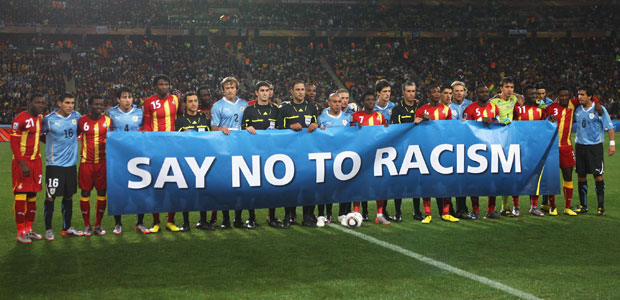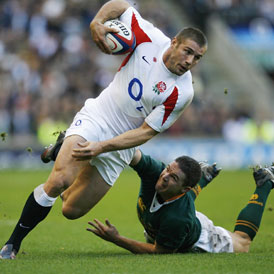How two sportsmen are fighting discrimination
As David Cameron hosts a football anti-discrimination summit at Downing Street, Channel 4 News talks to two former England internationals about racist and homophobic attitudes in football and rugby.

The prime minister called the summit following the high-profile Luis Suarez and John Terry affairs. He said that while Britain had led the world “in kicking racism out of football”, the old problems appeared to have “crept back in”. The Football Association (FA) has pledged to tackle all forms of discrimination – racism and homophobia – in football.
But John Scales, a former England footballer, told Channel 4 News it would be very difficult for a top-flight player to come out as gay.
Coming out
Mr Scales, who features in an anti-homophobia video produced by the FA, said he was “not surprised” that only one top player – the late Justin Fashanu, who committed suicide in 1998 – had chosen to reveal his homosexuality.
“Why would you? There’s so much to lose and so little to gain by doing so.”
Mr Scales, who is not gay, said he would like to live in a world where sportspeople were free to be true to themselves. “I believe it would be a huge weight lifted off their shoulders. I would like it if everybody was free of living with that burden.”
The former Wimbledon, Liverpool and Tottenham player said he remembered players being gently taunted in the dressing room if they did not have a girlfriend.
On one occasion, he said he made an “innocent comment” about rumours concerning a player’s sexuality in the Wimbledon dressing room that was overheard by John Fashanu, brother of Justin Fashanu.
“Fash took issue with it and the next day in training he gave me a forearm smash in the chest. It was clearly a very sensitive issue for Fash. It demonstrated how difficult he found the issue of his brother’s sexuality.”
Mr Scales said that fans and players had to understand there was “an important line that has to be drawn that cannot be crossed”, adding: “In the dressing room, you have got to be able to make players realise where that crosses the line of bullying and prejudice.”
Suarez and Terry
After weeks of deliberation, an FA panel concluded that Liverpool striker Luis Suarez had racially abused Manchester United defender Patrice Evra.
Following the verdict, he refused to shake Evra’s hand at a match at Old Trafford on 11 February – an incident for which he and his club later apologised.
Terry was stripped of the England captaincy by the FA while awaiting trial for allegedly racially abusing QPR’s Anton Ferdinand. Fabio Capello resigned as England manager because he was not given any say in the matter.
Great strides have been made over the last 20-30 years in combating racism, says John Scales, and recent events have not undone this progress. “You will never eradicate it, so it will rear its ugly head. But this has not put us back to square one at all.”
Surrey and England cricketer Steven Davies revealed he was gay in an interview with the Daily Telegraph in 2011. He was the first international cricketer to do so.
In 2009, former Wales winger Gareth Thomas became the first professional rugby player to come out as gay.
After the summit, Culture Secretary Jeremy Hunt said he had given the FA two months to develop an action plan to tackle racism and homophobia.
He said discussions had focused on the lack of black coaches, managers and referees and the use of social media, such as Twitter, to broadcast racist views.
Mr Hunt also said the culture in dressing rooms needed to be addressed - "how we draw the line between banter and offensive language".

Cohen’s campaign
Ben Cohen, who used to play rugby for England and was part of the 2003 World Cup-winning team (pictured left), retired from the game to set up the Ben Cohen Standup Foundation to fight bullying and homophobia.
He decided on the change after finding he had become a gay icon on Facebook, his mission “to kick the last phobia out of sport: homophobia”.
Mr Cohen, who is not gay, told Channel 4 News that fighting discrimination had to begin in the playground, where racism was no longer acceptable, but anti-gay remarks were still prevalent.
He said that for sportsmen to come out as gay, they had to be “comfortable” and blamed an older generation for holding them back. “Agents and managers play a massive part in that because they’re from a different generation and are probably not up with the times.”
If you’re going to stay in the closet… your personal life will take a tumble. It’s a horrible position to be in. Ben Cohen, former rugby international
When Gareth Thomas revealed his sexuality, it was not a surprise. “Everybody knew Gareth Thomas was gay before he came out.”
Mr Cohen said sponsors had a big part to play in combating discrimination. “They have to hold players responsible. If the brand is put at risk the player will be in trouble.”
He added: “If you’re going to stay in the closet… your personal life will take a tumble. It’s a horrible position to be in.”